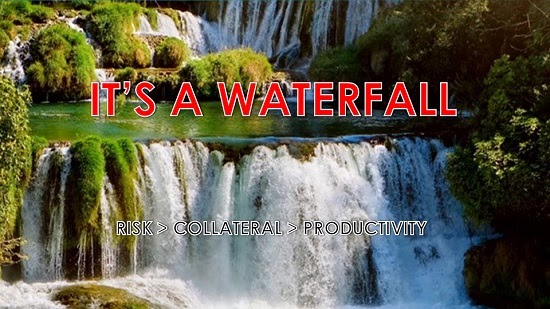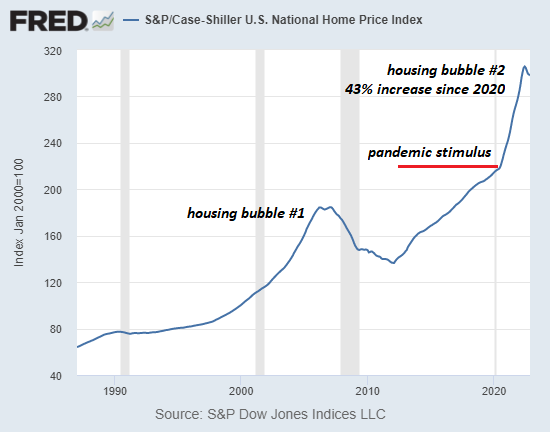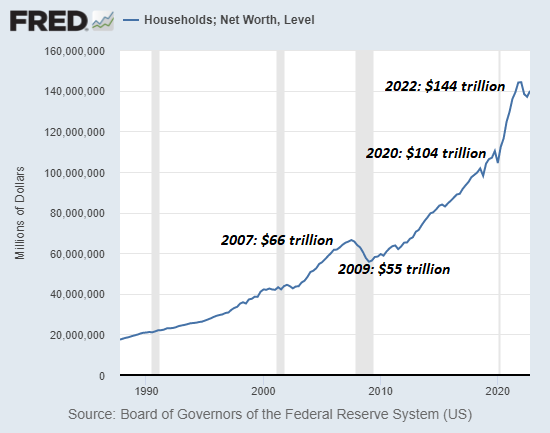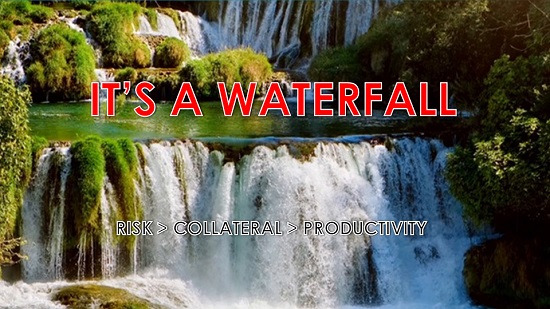
Together, these aspects produce a self-reinforcing cycle of financial obligation saturation, decreasing security and credit contraction.
If we wish to comprehend where the economy is going, credit and risk are good locations to start. Credit/debt is how the system develops and disperses cash: when a house buyer gets a home mortgage to purchase a house, that home mortgage increases the money supply. When the mortgage is paid off, the cash supply contracts.
The home loan is secured by 2 things: the income of the purchaser and your house, which is the security for the loan.
Danger is important to credit. Ought to the earnings of the buyer or the worth of your house decline greatly, the loan is at threat of default/ loss. In the national/global economy, the expense of credit reflects patterns and policies that raise or lower the threats which then affect the expense of credit: as threat increases, the expense of credit goes up.
As macro-risks increase, the cost of credit pushes home mortgage rates greater, increasing the portion of income the purchaser must devote to service the home mortgage. This leaves less earnings for extra financial obligation or consumption.
As soon as their earnings is maxed out, the buyer reaches debt saturation: there is no more extra earnings to service extra debt. The workaround to financial obligation saturation is to craft lower interest rates, so the buyer can re-finance debt at lower interest rates and reduce the month-to-month expense, maximizing more earnings for additional debt/consumption.
But when systemic risks increase, decreasing rate of interest is no longer possible. Rates rise to reflect the danger premium created by uncertainty and the greater capacity of defaults and losses.
Broadening credit is the lifeblood not just of intake however of possession assessments. House prices rise when the pool of purchasers with sufficient earnings and creditworthiness to purchase a house is bigger than the inventory of offered homes. When rates of interest plummeted in the pandemic stimulus stage, house prices skyrocketed as purchasers panic-bid for properties.
(The very same mechanism supports stocks, as corporations obtain cash and use it to buy back their own shares, boosting per-share evaluations.)
Declining rate of interest and rising asset valuations produce a virtuous cycle in which greater property rates supply more collateral to support bigger loans, loans which are simpler to service as rates of interest drop.
This self-reinforcing feedback of higher property prices/ increased security making it possible for more debt is plainly noticeable in the charts listed below of the Case-Shiller nationwide Home cost Index, which skyrocketed 43% in the 2 years from 2020 to mid-2022, and the Households Net Worth which increased by a shocking $44 trillion in the 2 years following the pandemic stimulus.
The risk profile of credit has actually altered both nationally and worldwide, and cost of credit can not fall back to near-zero. I resolved this in Why Rate of interest Are Not Returning to Zero.
At the very same time, efficiency and incomes have actually stagnated, leaving less earnings to service extra debt. As I explained in Here’s How We’ll Have Labor Scarcities and High Unemployment at the Exact Same Time, workers with abilities that are scarce and in demand will command greater incomes, while those with skills that are not in need will not be able to find work or keep high made earnings.
As risk and the cost of credit rise, the valuations of assets based on expanding credit decline. Not only do owners of assets such as houses feel less wealthy– the reverse wealth effect— the collateral readily available to protect extra credit drops.
Together, these elements produce a self-reinforcing cycle of financial obligation saturation, declining collateral and credit contraction: danger rises, credit costs increase, earnings and collateral decline and all the consumption and property appraisals that are dependent on credit growth review the falls.
Gordon Long and I discuss these dynamics in our most current video Its a Waterfall – Risk, Security & Productivity. (48 min, many charts)


 New Podcast: Turmoil Ahead As We Get In The New Period Of’Shortage’ (53 min ) My new book is now offered at a 10 % discount rate($8.95 ebook,$ 18 print): Self-Reliance in the 21st Century. Read the very first chaptertotally free(PDF)Read excerpts of all three chapters Podcast with Richard Bonugli: Self Reliance in the 21st Century (43 minutes)My
New Podcast: Turmoil Ahead As We Get In The New Period Of’Shortage’ (53 min ) My new book is now offered at a 10 % discount rate($8.95 ebook,$ 18 print): Self-Reliance in the 21st Century. Read the very first chaptertotally free(PDF)Read excerpts of all three chapters Podcast with Richard Bonugli: Self Reliance in the 21st Century (43 minutes)My
recent books: The Asian Heroine Who Seduced Me(Novel)
print$10.95, Kindle$ 6.95 Read an excerpt for free (PDF)
When You Can’t Go On: Burnout
, Reckoning and Renewal$ 18 print,$ 8.95 Kindle ebook; audiobook Check out the first area for free(PDF)Worldwide Crisis, National Renewal: A(Revolutionary )Grand Strategy for the United States(Kindle$9.95, print$24, audiobook)Check Out Chapter One for free (PDF ). A Hacker’s Teleology: Sharing the Wealth of Our Diminishing World(Kindle$ 8.95, print$20, audiobook$17.46)Check out the very first section free of charge(PDF). Will You Be Richer or Poorer?: Profit, Power, and AI in a Shocked World
(Kindle $5, print$10, audiobook) Check out the very first section free of charge(PDF). The Adventures of the Consulting Thinker: The Disappearance of Drake
(Novel)$4.95 Kindle,$ 10.95 print); read the very first chapters for free (PDF)Cash and Work Unchained $6.95 Kindle,$15 print)Read the first section for free Become a$1/month patron of my work by means of patreon.com. KEEP IN MIND: Contributions/subscriptions are acknowledged in the order got. Your name and e-mail stay private and will not be provided to any other individual, company or firm. Thank you, Stephen H.($100), for your outrageously generous contribution to this site– I am significantly honored by your support and readership. Thank you, Nicola L. (5.50 euros/month),
for your monstrously generous promise to this site– I am greatly honored by your support
and readership. Thank you, Scott B. ($5/month), for your superbly generous pledge to this site– I am greatly honored by your unfaltering support and readership. Thank you, Troy Z.
($25), for your much-appreciated generous contribution to this site– I am greatly honored by your


